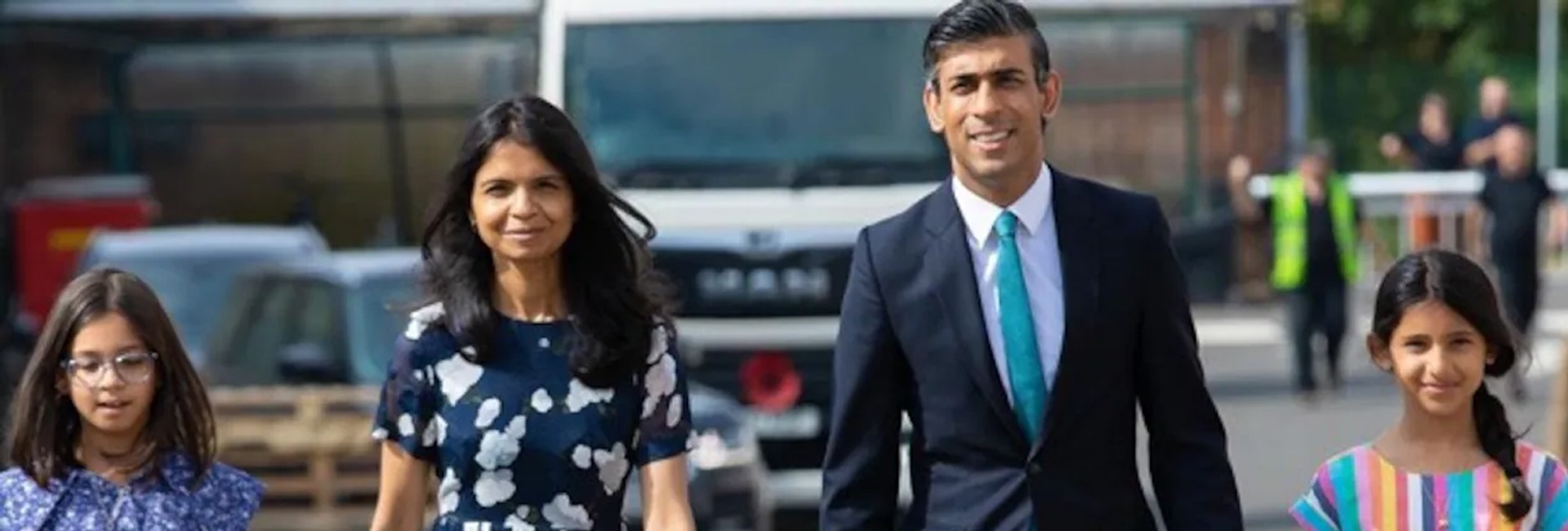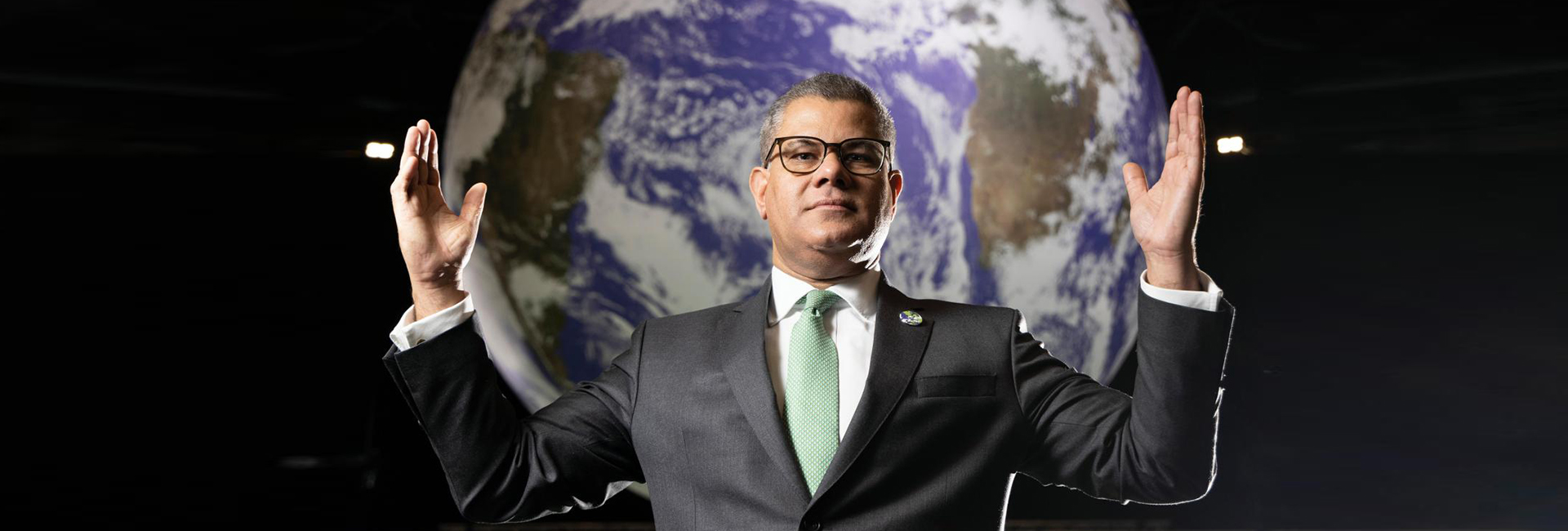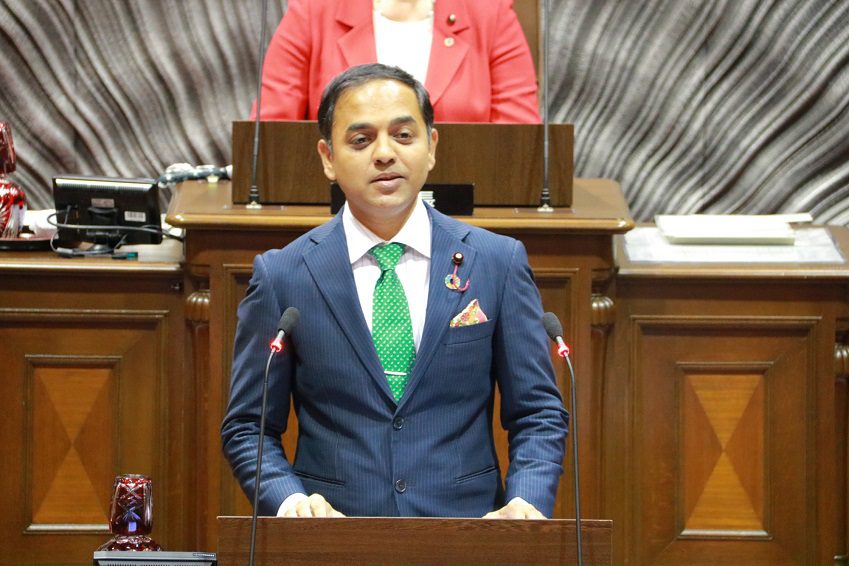(May 2, 2025) When Kamla Persad-Bissessar stood before cheering supporters following her recent landslide victory in Trinidad and Tobago’s general elections, it wasn’t just a political comeback. It completed a journey that began 136 years ago, when her great-grandfather left the soil of Bihar as an indentured labourer and stepped off a ship into an unfamiliar land, one that would one day witness his great-granddaughter ascend to its highest office.
Kamla’s return to power which was historic then, and resonant now, spans continents, centuries, and the deep echoes of cultural memory. As the first woman to serve as Prime Minister of Trinidad and Tobago, and the first female Prime Minister of Indian descent outside the Indian subcontinent, her story goes beyond personal ambition. It draws from a lineage of sacrifice, built over generations of economic struggle, cultural perseverance, and a steadfast pursuit of education.
With her 2025 victory, Kamla Persad-Bissessar stages a powerful political resurgence, returning to the helm a decade after her first term as Prime Minister from 2010 to 2015.
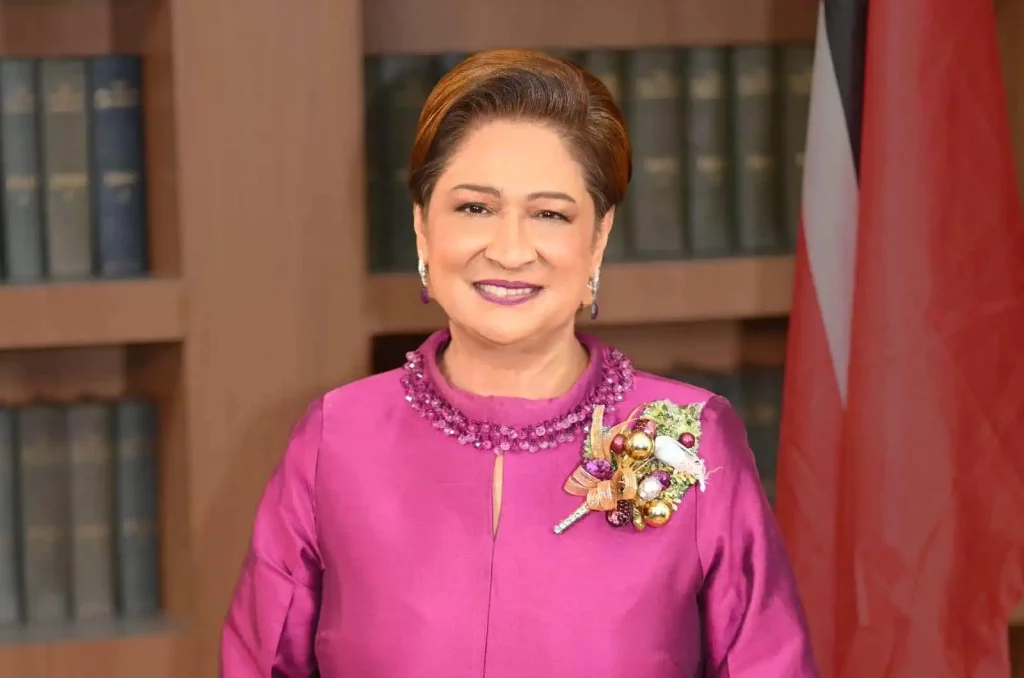
A childhood built on modesty and matriarchy
73-year-old Kamla Susheila Persad was born in Siparia, southern Trinidad, into a Brahmin Hindu Indian family. Her father, Lilraj Persad, worked as a bookkeeper for Texaco. Her mother, Rita Persad, once a domestic worker and labourer in the cocoa fields, saved diligently to open and run a modest roti shop.
Kamla grew up in a joint family household at Boodoo Trace in Penal, where traditions ran deep, and her grandmothers were influential forces. Her paternal grandmother was a seller of miscellaneous small items and founding member of Hindu prayer groups, and a community initiative Saraswati Prakash Mandir through which she mentored women. Her maternal grandmother and great-grandmother were both widowed early and worked in the sugarcane and cocoa fields to support their families. Kamla acknowledged these women as her role models in an interview, remarking, “I credit my mother, grandmothers, and great-grandmother for setting examples for me in feminism and paving the way for me.”
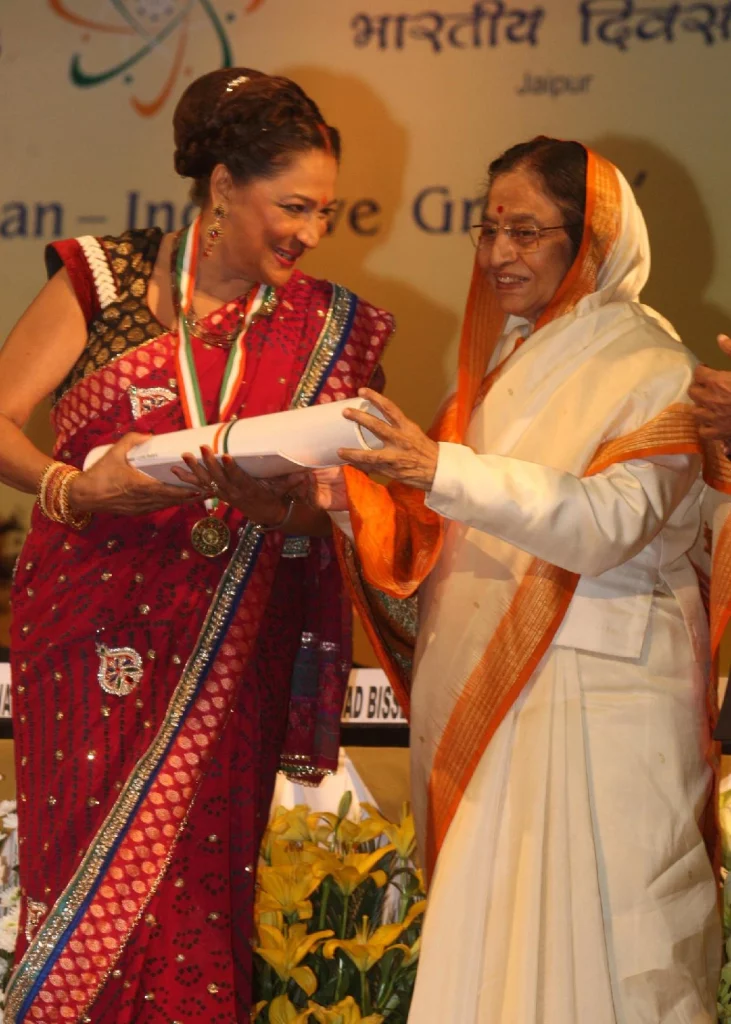
Kamla Persad-Bissessar received the Pravasi Bharatiya Samman in 2012
A migration etched in DNA
Kamla’s diasporic story traces back to 1889, when her paternal great-grandfather, Pandit Ram Lakhan Mishra, left Bhelupur village in Bihar, India, aboard a colonial ship bound for Trinidad. Part of the Indian indenture system, he and thousands like him were brought to the Caribbean as contract labourers during the British colonial rule.
Their migration created a seismic demographic shift that would forever alter the cultural landscape of Trinidad and other West Indian colonies.
In 2012, as Prime Minister of Trinidad and Tobago, during a state visit to India, Kamla Persad-Bissessar visited Bhelupur, reconnecting with her family’s village after 123 years of her forefather’s migration. Standing before a vast crowd, she gave a deeply emotional speech during which she mentioned:
Whatever I am today, it is because of my forefathers. It is in my genetic make-up and DNA. They, in fact, could not even read and write but they carried with them their quintessential culture and values of their community and land.
Kamla Persad-Bissessar
Her ancestral connection had been traced by researchers, after combing through historical records, including even the ship ticket confirming the lineage of her great-grandfather, Ram Lakhan Mishra from Buxar district of Bihar who arrived to Trinidad and Tobago in a ship named Volga.
Education, a passport to the world
Kamla’s academic journey mirrors her spirit of defiance and excellence. A top student and athlete at Lere High School in Trinidad and Tobago, she aspired to study abroad. However, her conservative father resisted the idea of a teenage girl leaving the island. “My father was very traditional, you know,” she later recalled. “But my mother held out.” With her mother’s support, Kamla left for Norwood Technical College in London as a 17-year-old in 1969. There, she also worked with the Church of England’s Children’s Society, gaining first hand experience in social welfare. It was her first step into the wider world and one that helped her develop a global outlook.
Later, her educational journey spanned continents. After marrying Gregory Bissessar in 1971, the couple moved to Jamaica, where Kamla earned her BA (Hons.) and Diploma of Education from the University of the West Indies. At just 25 years old, she became the youngest lecturer at UWI and taught at St. Andrew High School and the Jamaica College of Insurance.
Awarded a Fulbright Scholarship to Columbia University, she opted instead to pivot to law. Kamla went on to earn her Bachelor of Laws from UWI Cave Hill and graduated from Hugh Wooding Law School as the topper of her class in 1987, with awards for outstanding performance. In 2006, she completed an Executive MBA from UWI’s Arthur Lok Jack Graduate School of Business.
I have been very blessed with the opportunities I have had in education.
Kamla Persad-Bissessar

Kamla with her husband Gregory Bissessar during her days at the law school
Breaking barriers in politics
The Indian-origin leader entered politics in 1987 as an alderwoman in Saint Patrick County Council in Trinidad and Tobago. From there, her political ascent accelerated. She became an opposition senator (1994–1995), an MP for Siparia (since 1995), and Attorney General (twice). In 2010, she became the political party UNC’s leader, and shortly thereafter, Prime Minister of Trinidad and Tobago becoming the first woman of the country to hold the post. She led the People’s Partnership coalition to a historic win, building a multi-ethnic, ideologically diverse political force. Her leadership during this time earned her international praise, including being named among Time magazine’s 13 most influential female leaders in 2011.
Kamla Persad-Bissessar’s election campaign at that time was lauded as a model for bridging diversity under a common cause. She also became the first female Chairperson-in-Office of the Commonwealth, hosting the 2011 CHOGM summit in Port of Spain.
After the People’s Partnership lost the 2015 election, she returned as leader of the opposition, a role she held through the 2020 election, where the UNC increased its seat count. Despite not forming the government, Kamla maintained her grip on party leadership, preparing for a return that materialized in the 2025 victory.
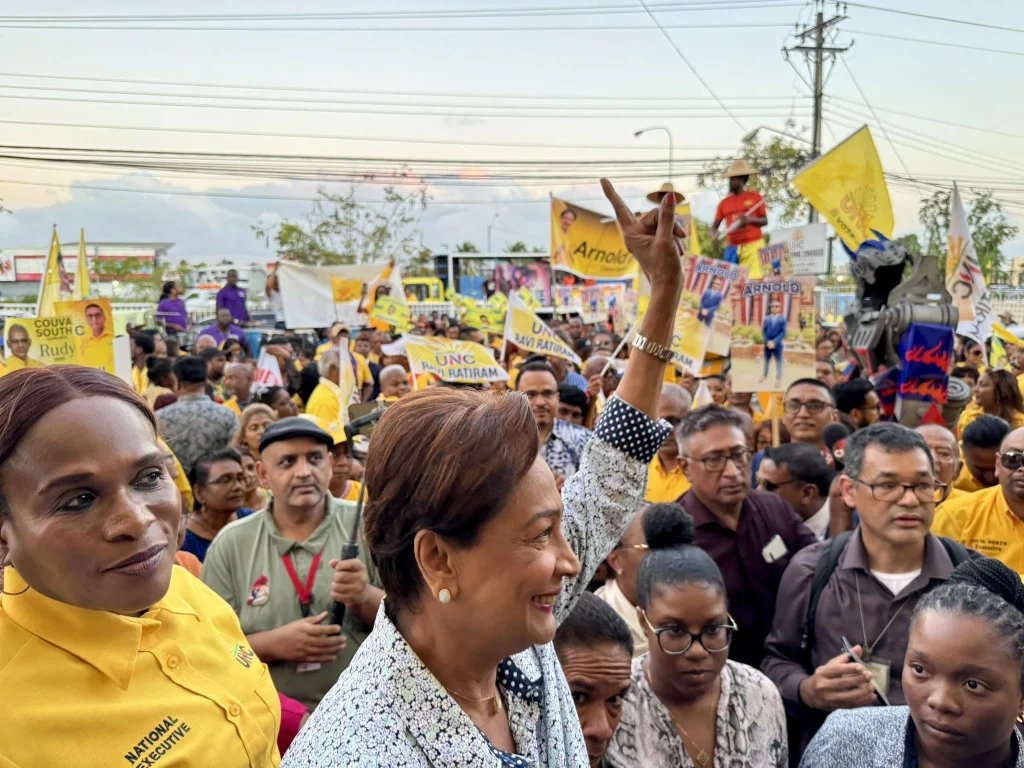
Kamla Persad-Bissessar during an election campaign
Tough times and many hard, invaluable life experiences have taught me that it’s never too late to help make something better for my fellow citizens. It’s a lesson that has always carried me throughout my long political life. It’s carrying me through now.
Kamla Persad-Bissessar
A diaspora flame rekindled
Kamla Persad-Bissessar’s second ascent to power is not just a political event, it is a reaffirmation of the Indo-Caribbean diaspora story. It tells tales of struggles of women in saris leading prayer circles, of cocoa field labourers turned small business owners, of a young girl defying tradition to study abroad, and of a great-granddaughter of indentured migrants earning full possession of the land as its Prime Minster not just once but twice.
Her words in Bihar echo still, “I had become the PM of a country because of the blessings of my ancestors and the people from their land.”

Kamala-Persad Bissessar after her election victory
From the dusty lanes of Bihar’s Bhelupur to the grand halls of Trinidad and Tobago’s Whitehall, Kamla Persad-Bissessar has carved a legacy that belongs to the Caribbean but speaks to every migrant family that dared to dream beyond the shore.
- Follow Kamla Persad-Bissessar on Twitter
Also Read: Trailblazing Women: Indian-origin politicians making waves globally
Also Read: Mira Nair’s son Zohran Mamdani is now an Indian-origin New York mayor candidate

